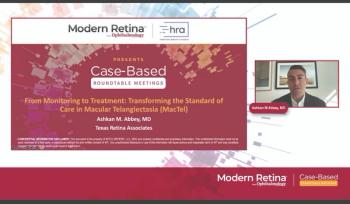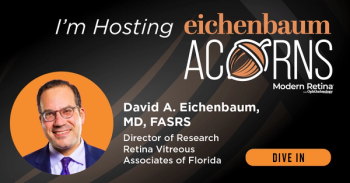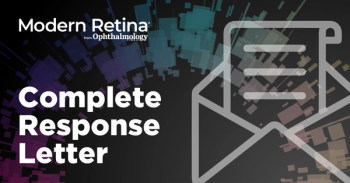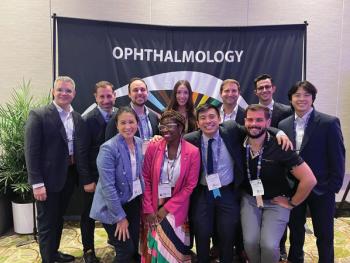
Adverum Biotechnologies provides an update on Phase 2 LUNA trial evaluating ixoberogene soroparvovec for wet AMD
Adverum Biotechnologies, Inc. provided an update on the company’s ongoing Phase 2 LUNA trial evaluating ixoberogene soroparvovec (Ixo-vec) for the treatment of wet age-related macular degeneration (wet AMD).
Adverum Biotechnologies, Inc. provided an update1 on the company’s ongoing Phase 2 LUNA trial evaluating ixoberogene soroparvovec (Ixo-vec) for the treatment of wet age-related macular degeneration (wet AMD).
In the press release1, Laurent Fischer, MD, the president and chief executive officer of Adverum Biotechnologies on the set up, progress, and goals of the LUNA study, saying “We are pleased to announce completion of enrollment in our Phase 2 LUNA trial. The LUNA study design allows us to evaluate efficacy and safety of two Ixo-vec doses, while optimizing the prophylactic steroid regimens. This double-masked, randomized trial includes a primary cohort of approximately 60 subjects enrolled in the United States. We are maintaining the option to enroll an additional cohort of approximately 12 subjects that may provide further data to inform our global development plan. The totality of data from the OPTIC and LUNA trials, which will include approximately 90 subjects dosed with Ixo-vec, is the largest gene therapy pre-phase 3 dataset in wet AMD with subjects to be followed out to five years. This should give us confidence to proceed with a significantly de-risked global pivotal trial strategy.”
Star Seyedkazemi, PharmD, chief development officer of Adverum Biotechnologies also noted the progress of this study and took the time to thank those who are contributing their time and expertise to the study in his comments in the news release1: “We are extremely grateful to the investigators, study coordinators, and other site staff for their partnership in the design and conduct of the LUNA trial and to all the patients who are taking part in the study. We believe Ixo-vec, with its previously demonstrated continuous expression of aflibercept over 3 years following a single, in-office intravitreal injection, has the potential to bring immense value to patients, caregivers, retinal specialists, payers, and healthcare systems.”
The company shared1 that the design of the primary LUNA cohort, which is evaluating the efficacy and safety of Ixo-vec in approximately 60 subjects randomized equally between the 2x10^11 vg/eye (2E11) and 6x10^10 vg/eye (6E10) doses. The subjects are also randomized across four prophylactic regimens. Approximately 40 patients will receive one of two local ocular corticosteroid regimens. The remaining 20 subjects will receive one of the local ocular corticosteroid regimens, plus oral prednisone to inform the decision of whether to include an oral prophylactic in future trials.
Recent Highlights for Ixo-vec
- Innovation Passport: In April 2023, the United Kingdom’s Medicines and Healthcare Products Regulatory Agency granted Ixo-vec an Innovation Passport under the Innovative Licensing and Access Pathway (ILAP). This designation is intended to accelerate the regulatory and market access interactions in the United Kingdom. To date, Adverum is the only ocular gene therapy company in wet AMD to have been granted Fast Track Designation by the US FDA, PRIME designation by the European Medicines Agency, and most recently the Innovation Passport under ILAP.
- Ixo-vec Nonclinical Data: Adverum presented an oral presentation of nonclinical data supporting Ixo-vec’s clinical development at the ASGCT 2023 Annual Meeting.
- Ixo-vec Bilateral Dosing: Adverum presented data outlining the rationale for staggered, bilateral administration of Ixo-vec in patients with bilateral disease. Up to 42% of wet AMD patients experience neovascularization in the second eye in the first 2 to 3 years following diagnosis in the primary eye, indicative of an unmet need for many wet AMD patients globally.
- Ixo-vec was administered to 1 eye, then 2 months later to the fellow eye of NHPs. Following the second, staggered administration of Ixo-vec, the fellow eye demonstrated aflibercept protein levels within the targeted therapeutic range.
- Staggered, bilateral intravitreal (IVT) administration of Ixo-vec was well tolerated, with encouraging therapeutic activity, as well as no increase in intraocular inflammation levels.
- These data demonstrate for the first time that the ocular humoral response in NHP is compartmentalized to the eye dosed with AAV capsid.
- Ixo-vec Dosing at 2E11 and 6E10 Human Equivalent Doses: In an oral presentation of nonclinical data, Adverum demonstrated consistent aflibercept protein levels across the 2E11 and 6E10 doses in NHPs, indicating that the 6E10 dose may offer similarly robust levels of efficacy as the 2E11 dose with the potential of an improved inflammation profile.
- Ixo-vec Biodistribution: In a poster presentation, Adverum presented data on an evaluation of intraocular per cell biodistribution of Ixo-vec vg and aflibercept mRNA via in-situ hybridization in NHP eyes at the human equivalent dose of 2E11 and 6E10.
- Ixo-vec Bilateral Dosing: Adverum presented data outlining the rationale for staggered, bilateral administration of Ixo-vec in patients with bilateral disease. Up to 42% of wet AMD patients experience neovascularization in the second eye in the first 2 to 3 years following diagnosis in the primary eye, indicative of an unmet need for many wet AMD patients globally.
- Additional Pipeline Programs: Adverum unveiled IVT gene therapy programs for the treatment of Geographic Atrophy (GA) and for optogenetics at the ASGCT 2023 Annual Meeting.
- Complement Factor I Program for Dry AMD / Geographic Atrophy: In a poster presentation, Adverum introduced its GA program delivering complement Factor I (CFI), a fundamental component and rate-limiting enzyme of the complement cascade, as a payload utilizing two IVT capsids: 7m8 and LSV1. Both the 7m8 and LSV1 capsids packaged with AAV-CFIco yielded robust intraocular human CFI levels in NHPs, and both proprietary capsids were well tolerated in non-human primates (NHPs).
- CaMeRaOpsin Program for Optogenetics: In a poster presentation, Adverum presented data on an optogenetic program utilizing an engineered melanopsin mutant that could serve as a therapeutic transgene for optogenetic vision restoration in indications with photoreceptor loss such as advanced GA.
- Ray Therapeutics License: In June 2023, Adverum announced that it granted a non-exclusive, royalty-bearing license of its AAV.7m8 IVT vector capsid to Ray Therapeutics.
Anticipated Milestones
- Late Q3 2023 –Anticipate aflibercept protein levels for percentage of cohort with a minimum of 14 weeks of follow-up as of data cutoff.
- Q4 2023 – Anticipate LUNA preliminary efficacy and safety data for percentage of cohort.
About Ixo-vec in Wet AMD
Adverum is developing ixoberogene soroparvovec (Ixo-vec, formerly referred to as ADVM-022), its clinical-stage gene therapy product candidate, for the treatment of wet AMD. Ixo-vec utilizes a proprietary vector capsid, AAV.7m8, carrying an aflibercept coding sequence under the control of a proprietary expression cassette. Unlike other ophthalmic gene therapies that require surgery to administer the gene therapy under the retina (sub-retinal approach), Ixo-vec is designed to be administered as a one-time IVT injection in the physician’s office, deliver long-term efficacy, reduce the burden of frequent anti-vascular endothelial growth factor (VEGF) injections, optimize patient compliance and improve vision outcomes for patients with wet AMD. In recognition of the need for new treatment options for wet AMD, the U.S. Food and Drug Administration granted Fast Track designation for Ixo-vec for the treatment of wet AMD. Ixo-vec has also received PRIME designation from the European Medicines Agency and the Innovation Passport from the United Kingdom’s Medicines and Healthcare Products Regulatory Agency for the treatment of wet AMD.
About LUNA Trial of Ixo-vec in Wet AMD
The LUNA trial is a double-masked, randomized, Phase 2 trial being conducted at approximately 40 sites in the U.S. and Europe. LUNA trial will evaluate Ixo-vec in subjects with wet AMD who are 50 years or older and have demonstrated a response to anti-VEGF treatment. Up to 72 subjects will be enrolled, with approximately 60 subjects in the primary LUNA cohort randomized equally between the previously evaluated 2E11 vg/eye and new, lower 6E10 vg/eye doses. Subjects will also be randomized across four prophylactic regimens. Approximately 40 patients will receive one of two local ocular corticosteroid regimens. The remaining 20 subjects will receive one of the local ocular corticosteroid regimens, plus oral prednisone to inform the decision of whether to include an oral prophylactic in future trials. The corticosteroid regimens in LUNA were designed to cover the period of peak immunogenicity observed in non-clinical studies and in the Phase 1 OPTIC study.
The LUNA trial primary endpoints are mean change in best corrected visual acuity (BCVA) from baseline to one year, as well as the incidence and severity of adverse events. Important secondary endpoints include, the mean change in central subfield thickness (CST) from baseline to one year and assessing the effectiveness of prophylactic corticosteroid regimens on minimizing inflammation. Additionally, LUNA will assess aflibercept protein levels starting at Week 14 and include an interim analysis at Week 26. LUNA participants will have the option to be evaluated for safety and efficacy as part of the long-term extension of the study.
Reference:
Adverum Biotechnologies Completes Enrollment of Phase 2 LUNA Trial in Wet AMD and Reports Second Quarter 2023 Financial Results. Adverum Biotechnologies Inc. August, 10, 2023. Access August 17, 2023. https://www.globenewswire.com/news-release/2023/08/10/2723148/0/en/Adverum-Biotechnologies-Completes-Enrollment-of-Phase-2-LUNA-Trial-in-Wet-AMD-and-Reports-Second-Quarter-2023-Financial-Results.html
Newsletter
Keep your retina practice on the forefront—subscribe for expert analysis and emerging trends in retinal disease management.












































